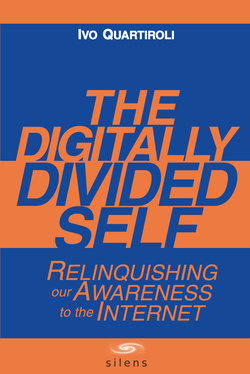Читать книгу The Digitally Divided Self: Relinquishing our Awareness to the Internet - Ivo Ph.D. Quartiroli - Страница 12
На сайте Литреса книга снята с продажи.
Technology Can’t be Challenged
ОглавлениеWhen I started, computers were in transition from mainframes to PCs –a milestone in the empowerment of the individual, who could finally manage his own data, in his own time and place, and on his own computer. Floppy disks may have had very limited capacity, but we welcomed this freedom. Today PCs are more powerful than those mainframes, but we willingly give our data and computations back to Web services in the cloud.
Since the advent of computers, there has been concern about how they affect our minds. As computers spread, Sherry Turkle pointed out how they influence construction of the personal self, and Joseph Weizenbaum explored the attitudes of people working with computers. In reality, however, there are not as many people interested in those subjects as there are people chasing after the latest technological gadgets.
There are on the Net itself articles critical of the information society. Some correctly emphasize the loss of concentration through multiple mental stimuli. “Is Google Making Us Stupid?” by Nicholas Carr (2008) created a wave of debates. Other commentators have written about the prominence which the Net gives to the latest news, and how small chunks of information force historical context and broader implications into the shadows.
Some people express concern about Internet addiction to online auctions like eBay, to porn and cybersex, and online gaming and chats. Parents and teachers are legitimately concerned about protecting minors from information inappropriate for their age, from cyberpredators to cyberbullying.
Even though critical voices are present, it is not easy to criticize technology. In 2009, neuroscientist Susan Greenfield spoke before the House of Lords about the risk of changes in children’s brains from overuse of social networks. Bloggers and websites counterattacked with the allegation that she had no scientific proof for her “conjecture and opinions.”
This looks like a reverse inquisition. As the Church would condemn anything which wasn’t compatible with Holy Scripture, now it looks like nothing has value if it is not backed by hard scientific proof and plenty of data. With that premise, there can be no value in any inner, philosophical, or ethical quest. What’s not calculable, statistically coherent or scientifically demonstrable is categorized as mere “opinion” and far from truth. Welcome to Technopoly, as Neil Postman defined it.
Saying that “it is not scientific” or “we don’t have enough data” are typical defenses that technologically-oriented people use to counteract criticism or expressions of concern. They also take the position that the answer to any problem arising from technology lies in technology itself: more options, more speed, improved functionalities, a newer version.
We know the common slogans. “Technology and tools in themselves are neutral – it’s about how you choose to use them.” Any tool, however, has wider reverberations in both the social and inner worlds, aside from the way we use it. The mere presence of cars, for instance, reshaped the landscape and changed our connection with it, relocated people, changed the air we breathe, made people more sedentary, revised geopolitical relationships, and built a huge economy based on the powering, production and maintenance of cars and roads. Being without a car is possible but hard to manage, especially in places where public transportation is not in much demand. Yes we have choices in how we use cars: we can kill people with them or transport food to a poor community, but we cannot avoid their effect on our lives. They extend the possibilities of our legs, which grow weak through disuse. And without use, we tend to detach our attention from them. Likewise, TV extends our vision of the world beyond our neighborhood – but the very act of watching isolates us from neighbors and family.
Computers and the Internet are influencing our lives in more and more powerful ways. If cars reshaped the landscape, computers are making it useless. We can do almost anything in front of our screen without going anywhere. And then when we’re outdoors, we can experience the landscape filtered by the “augmented reality” tools of our smartphones. Computers and the Internet have also created a huge economy built on the growing desire for both gadgets and information. They influence our bodies, minds, and inner lives even more pervasively than cars.
Whether we are using the Internet for spreading racial hatred or for organizing support groups for people in trouble, we employ software tools within a certain body-mind setting in front of a screen, and we are communicating with people who share similar settings and tools. Inadvertently, we are feeding the huge Internet economy of software, telecommunication data lines, and hardware – equipment that is mostly produced in countries where labor is cheap and the environmental impact of their production is not debated. Countries that we will likely never visit.
